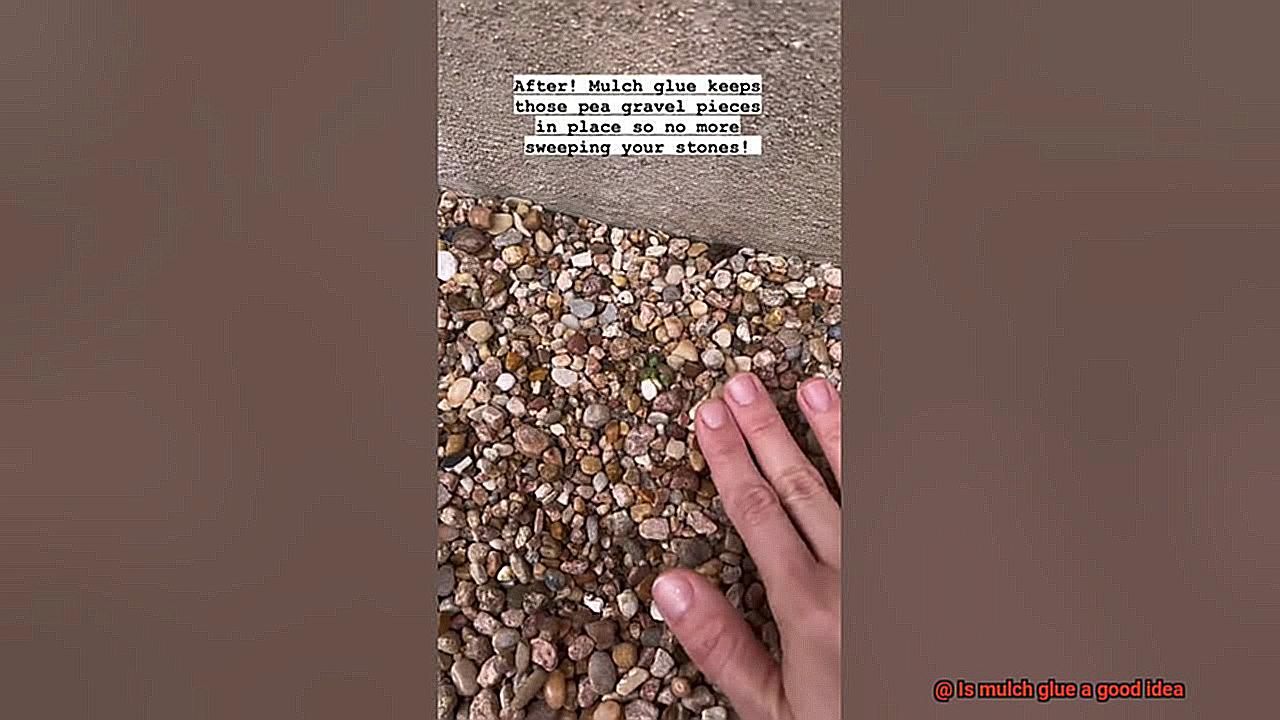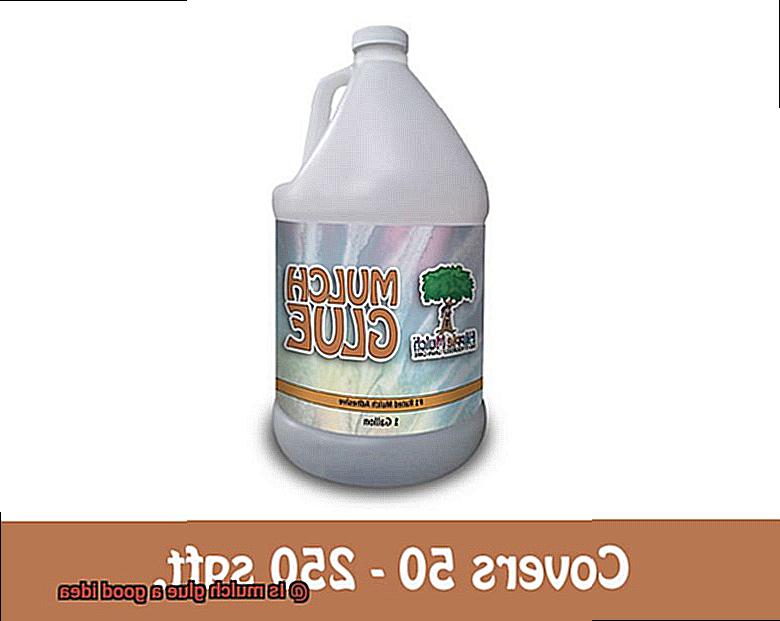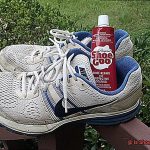Today, we’ll be exploring whether this sticky substance is a good idea for your garden or landscape. Mulch glue, also known as mulch adhesive, is a nifty product that keeps your mulch in place, preventing it from getting washed away or blown around by pesky winds.
At first glance, it seems like the perfect solution to all your mulching woes. But like any gardening technique, there are pros and cons to consider.
So, buckle up and let’s see if this sticky stuff deserves a spot in your gardening arsenal.
What is Mulch Glue?
Contents
Mulch is a versatile material that offers numerous benefits to your landscape. Not only does it enhance the visual appeal, but it also conserves moisture, controls weeds, and protects the soil. However, keeping mulch in place can be a challenge, especially in areas prone to wind or heavy rainfall.
Enter mulch glue. In this article, we will explore the wonders of mulch glue and how it can revolutionize your mulched areas into stable and long-lasting landscape features.
The Power of Mulch Glue:
Mulch glue, also known as mulch adhesive or mulch tackifier, is a specially formulated substance that acts as an adhesive to bind mulch particles together. It creates a secure bond that prevents mulch from scattering or being displaced by external factors like wind or rain. With mulch glue, say goodbye to the hassle of constantly reapplying mulch and welcome a beautifully maintained landscape.
Benefits of Mulch Glue:
- Enhanced Stability: The primary benefit of using mulch glue is the increased stability it provides to your mulched areas. It forms a cohesive layer that keeps the mulch in place, even during heavy rainfall or strong winds. This not only maintains aesthetic appeal but also prevents erosion and soil loss.
- Weed Control: Mulched areas are often susceptible to weed growth, which can be time-consuming to manage. Mulch glue acts as a barrier, inhibiting weed germination and penetration into the soil. This reduces the need for frequent weeding, saving you valuable time and effort.
- Moisture Retention: Water conservation is crucial in any landscape. Mulch glue helps retain moisture by reducing evaporation caused by wind or sun exposure. This is particularly beneficial in arid regions or during dry spells when every drop of water counts.
- Environmentally Friendly Options: Many mulch glues are now available in environmentally friendly formulations. These products are biodegradable, non-toxic, and safe for plants, animals, and water sources. By choosing eco-friendly mulch glue, you can maintain a healthy and sustainable landscape.
Application and Considerations:
When using mulch glue, it is crucial to follow the manufacturer’s instructions for application. Typically, the adhesive is sprayed or poured onto the surface of the mulched area. Applying an even coating ensures all exposed mulch particles are adequately covered.
However, caution must be exercised to avoid over-application. Too much glue can create an impermeable barrier that hinders water and air exchange in the soil, potentially harming plant health. Balancing the right amount of mulch glue is key to maintaining a healthy ecosystem.
Benefits of Using Mulch Glue
Mulch glue is here to rescue your gardening woes. In this article, we will explore the myriad benefits of using mulch glue and why it is a must-have for every garden enthusiast. So, grab a cup of tea and join us on this journey to transform your garden into a thriving oasis.
Weed Control:
Say goodbye to pesky weeds that invade your precious plants. Mulch glue forms a protective barrier, preventing weed seeds from germinating and taking over your garden. With mulch glue, you can bid farewell to endless hours spent pulling weeds, allowing you to focus on the aspects of gardening that truly bring you joy.
Moisture Retention:
Water is the lifeblood of your plants, and mulch glue acts as a shield, preserving moisture in the soil. By creating a seal over the soil surface, it reduces water loss through evaporation. This is especially beneficial in dry climates or during droughts when every drop of water counts. Your plants will thank you for the consistent hydration they receive.
Erosion Control:
Mother Nature can be unpredictable, but mulch glue ensures that your garden remains intact even during heavy rainfall or strong winds. It firmly adheres the mulch to the ground, preventing valuable topsoil from being washed away. With mulch glue as your ally, erosion becomes a thing of the past, and your plants can flourish undisturbed.
Improved Aesthetic Appeal:
Who doesn’t love a well-groomed garden bed? Mulch glue keeps your mulch in place, maintaining a neat and polished look. No more scattered mulch on walkways or driveways – simply sit back and enjoy the picturesque view. By reducing the need for constant clean-up, mulch glue gives you more time to savor the beauty of your garden.
Longer Lasting Mulch:
Are you tired of constantly replenishing your mulch? Mulch glue comes to the rescue. Its adhesive properties ensure that the mulch stays in place, extending its lifespan. This means you can enjoy the benefits of mulch, such as weed suppression and moisture retention, for a longer period, allowing you to focus on other gardening tasks.
Environmental Benefits:
With mulch glue, you can embrace environmentally friendly gardening practices. Say goodbye to harmful chemicals that harm the ecosystem and hello to a biodegradable alternative. Mulch glue poses no risk to plants, animals, or beneficial insects, making it a safe and sustainable choice for conscious gardeners.
Considerations When Deciding to Use Mulch Glue
Considering whether or not to use mulch glue requires careful evaluation of several key factors. First, it is crucial to determine the compatibility of the mulch with the adhesive. Certain types of mulch may not adhere well or could be damaged by the glue. Reading and following the manufacturer’s instructions is essential to ensure a successful application.
Climate and weather conditions in your area should also be taken into account. If you live in an area with minimal wind or rainfall, the natural weight and interlocking properties of the mulch may be sufficient to keep it in place. However, if your region experiences frequent storms or strong winds, using mulch glue can offer added stability and prevent the mulch from being scattered across your yard.

Another consideration is the intended use of the mulched area. If there is high foot traffic or equipment frequently used in the area, such as a playground or garden bed, using mulch glue can help maintain a neat appearance and prevent displacement.
While there are benefits to using mulch glue, it is important to be aware of potential drawbacks. Once the glue has dried and formed a barrier, it may be challenging to amend or change the mulch layer without damaging plants or disturbing the soil below. Additionally, water and nutrient penetration into the soil may be limited, affecting plant health. Adequate watering and fertilization are necessary to mitigate this concern.
Cost should also be considered when deciding to use mulch glue. It is an additional expense, so weighing the benefits against the cost is important. In some cases, alternative methods of mulch stabilization, such as landscape fabric or edging, may prove more cost-effective.
Quality and Application of Mulch Glue
Mulch glue, also known as mulch adhesive or mulch binder, is a game-changer in maintaining the look and functionality of your outdoor spaces. Understanding the quality and application of mulch glue is essential for both professional landscapers and avid gardeners alike.
When it comes to quality, durability is key. Look for an environmentally-friendly option that is non-toxic and safe for plants and animals. You don’t want an adhesive that harms your beloved plants or pollutes the environment.
Applying mulch glue is straightforward but following the manufacturer’s instructions is crucial. Typically, you’ll spray or apply the glue evenly over the surface of the mulch. Make sure every area is adequately covered for maximum effectiveness. Mulch glue can be used with various types of mulch such as wood chips, bark, straw, or shredded leaves. However, always check the product label or consult a professional to ensure compatibility.
Now let’s dive into the advantages of using mulch glue. Firstly, it offers erosion control by keeping the mulch in place. This helps retain moisture in the soil and protects plant roots from extreme temperatures. Perfect for sloped areas or places prone to heavy rainfall.
Mulch glue also enhances aesthetics by creating a uniform and tidy landscape. It suppresses weed growth, reducing the need for constant maintenance. Ideal for commercial settings or public areas where aesthetics matter.
However, there are considerations to keep in mind. Proper preparation of the mulch is crucial before applying the glue. Remove weeds or debris and level the surface for a smooth base. Additionally, natural decomposition of mulch may provide enough stability without glue if there’s minimal foot traffic or wind exposure.
Consider the cost-effectiveness of using mulch glue. Weigh the cost of purchasing and applying against potential benefits.
How Mulch Glue Enhances Stability, Weed Control, and Moisture Retention
In this blog post, we will dive into the incredible ways mulch glue enhances stability, weed control, and moisture retention, making it an essential tool for any gardener or landscaper.
Enhanced Stability:
Mulch glue acts as a binding agent, creating a cohesive layer that defies the forces of wind, rain, and foot traffic. Say goodbye to scattered and displaced mulch. With mulch glue, you can create a protective shield that holds the mulch firmly in place, preserving the pristine look of your landscape. No more constant re-application of mulch needed.
Effective Weed Control:
Weeds are the villains of any garden, but fear not. Mulch glue comes to the rescue. While mulch itself already acts as a natural weed barrier by blocking sunlight and preventing weed seeds from germinating, some persistent weeds may find their way through.
Enter mulch glue – a powerful ally that forms an impenetrable barrier against weed growth. Bid farewell to those relentless weeds and enjoy a more weed-free landscape.
Improved Moisture Retention:
Keeping your soil moisturized is crucial for vibrant plant growth, and mulch is renowned for its ability to reduce evaporation and maintain consistent soil temperature. However, loose mulch layers can still allow water to escape, leading to increased irrigation needs. That’s where mulch glue saves the day. By binding the mulch particles together, it creates a compact layer that minimizes water loss. This means less frequent watering and healthier plants thriving in moist soil.
Tips for Success:
- Choose an environmentally-friendly mulch glue to protect your plants and the environment.
- Follow the application instructions carefully and ensure every inch of mulch is covered.
- Prepare your mulched area properly by removing any unwanted intruders and creating a smooth surface for optimal results.
Potential Drawbacks of Using Mulch Glue
Mulch glue, the superhero of the garden, offers many benefits, but it’s crucial to understand the potential drawbacks. Here are some things to keep in mind:
- Cost: Mulch glue can be pricier than traditional mulch materials, such as wood chips or straw. This expense may not be feasible for those on a tight budget or tackling large-scale landscaping projects.
- Limited aesthetic options: Unlike traditional mulch materials that come in a wide variety of colors and textures, mulch glue offers a restricted range. This limitation can hinder creativity and customization in your landscaping design.
- Difficulty in adjusting or removing mulch: Once applied, mulch glue becomes challenging to adjust or remove. Traditional mulch materials allow for easy movement or replacement, providing flexibility in design. However, the adhesive properties of mulch glue make changes risky without damaging the soil or plants.
- Potential harm to plants and soil: Concerns arise regarding the chemicals used in mulch glue, which can leach into the soil and harm beneficial organisms or alter nutrient levels. Improper application or excessive use can create a barrier that hampers water and air from reaching plant roots, resulting in poor plant health.
- Environmental impact: Mulch glue, typically made from synthetic materials, raises environmental concerns. The production and disposal of these materials contribute to pollution and waste. In contrast, traditional mulch materials derived from natural sources tend to be more environmentally friendly.
BGDdXiWx290″ >
Conclusion
In conclusion, mulch glue can be a game-changer for gardeners and landscapers seeking stability, weed control, and moisture retention in their landscapes. By creating a united front that binds mulch particles together, mulch glue thwarts the pesky scattering or displacement of mulch caused by unruly wind or relentless rain. Not only does this keep your garden looking pristine, but it also safeguards against erosion and soil loss.
Say goodbye to endless weeding sessions. Mulch glue acts as an impenetrable fortress against weed growth, slashing the need for constant maintenance and freeing up precious time and energy. Additionally, it plays the role of moisture magician by reducing evaporation due to gusts of wind or scorching sun rays. This makes it an invaluable ally in dry regions or during drought spells.
Opting for an environmentally friendly option ensures that mulch glue is kind to plants, animals, and water sources alike. However, before diving headfirst into the world of mulch glue, there are a few things to consider. Proper preparation of the designated area is paramount prior to applying the glue, while exercising caution to avoid excessive application is crucial in order to maintain healthy water and air exchange in the soil.
While the benefits of mulch glue are undeniably enticing, it’s important to weigh them against potential drawbacks such as cost, limited aesthetic choices, challenges in adjusting or removing mulch once glued down, potential harm to plants and soil health, as well as environmental impact.
Ultimately, whether you choose to embrace the power of mulch glue depends on your unique needs and preferences.






